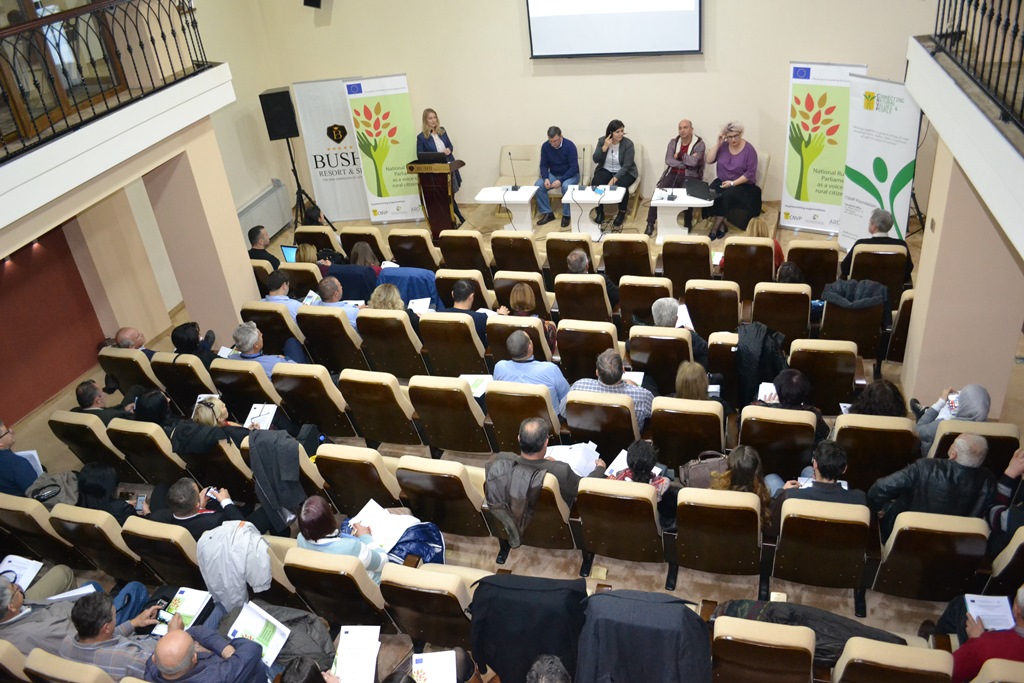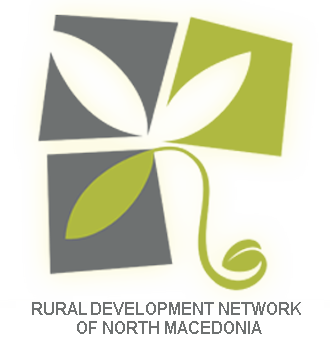On 24 November 2017 the project team of the “National Rural Parliament – a Voice of the Rural Population” organized a regional conference at Bushi Hotel in Skopje on “Regional networking and sharing best practice in rural development policies”.
The goal of the workshop was to initiate a dialogue between the civil sector from rural areas and the policy makers at national level in order to provide civil society participation in the decision making process. The workshop introduces development prospects for the country and the region of common interest both for policy makers and policy users. Experience shared by representatives of organizations from Serbia, Albania, Croatia and Bosnia and Hercegovina, working in the field of rural development, provided opportunities for networking and exchange of best practices in the field of rural development policies in the region.

The presentation drafted by the MAFWE representative, Valentina Stojanovik-Tufa, provided an overview of efforts made to improve the dialogue between the policy creators in agriculture and rural development and the civil sector. This presentation initiated a panel discussion on how to improve policies on sustainable development in rural areas through cooperation of national governments and the civil sector.
The following panellists shared the experience from their countries within the different contexts:
Trajan Dimkovski – Ministry of Agriculture, Forestry and Water Management of RM;
Maja Markovska – Milieukontakt Macedonia;
Dragan Roganovic – Serbian Rural Network;
Julia Bakota – Croatian Rural Network.
The panel discussion allowed many stakeholders and rural civil organization to expand their knowledge on networking and on potential ways of improving the dialogue between policy makers and the civil sector. In order to better understand the current state of the rural areas in the Western Balkans, panellists shared experience related to the dialogue between the civil sector and the policy makers in the field of rural development, stating some of the obstacles that have risen during this process. At the end they provided their recommendations on improving the dialogue between policy makers and the civil sector in the field of agriculture and rural development.
The panel discussion was followed by presentations of positive examples of the civil sector role and its participation in implementing activities for sustainable development in rural areas.
Vasko Hadzievski shared results from the survey carried out as part of the project on National Committee on Family Farming in the Republic of Macedonia, whose goal was to identify the state of family farming businesses in Macedonia and their role in rural development.
Albana Hasmeta, a representative of the Albanian Rural network, presented the Economic Development of Women in Rural Areas, including the current state of Albanian rural women with regards to education and the labour market position, as well as examples of good practice, including challenges faced in the process of improving the economic situation of rural women.
Dusko Cvjetinovic, representative of the civil association ‘Something More’ from Bosnia and Hercegovina, presented results from three projects intended for young people in rural areas. Through a scholarship programme of in Bosnia and Hercegovina, 85 students were awarded scholarships for return of 500 working hours for the benefit of the community at annual level. The project Get Employed by Volunteering – Volunteer to Get Employed, was working on promoting volunteering and its institutionalisation in 2010. The project Life Skills for the Future – Let’s Learn, Let’s Make!, contributed to development of entrepreneurial skills of pupils in the 7th, 8th and 9th grades and prepared them for better competitiveness at the labour market in the future.
Petar Gjorgievski, the President of the Macedonian Rural Network discussed ‘Regional networking and exchange of good practice in the rural development policies’. In his presentation he stressed the importance of networking in the process of distribution of innovations and good practice, linking rural actors, stimulating projects on cooperation and overcoming the isolation some rural regions are facing. Further on, he informed the participants about the various type of networks such as institutional networks funded by the European Commission and non-formal networks at European, national, regional and local level, not funded by the European Commission. As a model of regional networking, he presented the Balkan Rural Development Network who unifies rural development networks from Croatia, Bosnia and Hercegovina, Macedonia, Serbia, Monte Negro, Albania and Kosovo.
Dragan Roganovic, the President of the Serbian Rural Development Network presented experience in rural tourism and the project at the village of Rudno and the National Park Golija. The project is being implemented in 5 municipalities within the National Park Golia and its activities include development of pilot centres for protection, development and promotion, improving the capacity of the local population on development of rural tourism, support of the five municipalities and cooperation in the field of development of rural tourism and improving the infrastructure for tourism (marking pathways for hiking and biking, etc.).
Presentations encouraged a discussion of the participants and the following conclusions were made:
– Improving inclusiveness of local population/actors in drafting strategies and programmes of essential importance, since this is the only way for rural development measures to work.
– Mechanisms and tools developed by different non-governmental organisations may facilitate making of strategies and policies at local level, so they must be taken into account seriously.
– When designing policies, it is important to establish a mechanism for feedback from local at national level. This is important for the purpose of checking whether policies and measures are applicable and successfully implemented.
– Efficiency of the state administration must improve, but the local population should also understand that if participatory approaches are respected, they need time to be implemented.
– Civil society, in particular people living in rural areas, must strengthen the capacity continuously in order to be prepared for active involvement in drafting strategies and programmes at local or national level.
The regional workshop was attended by more than 60 representatives of active rural civil organisations in Macedonia. They were informed by the partners about the project and the opportunity to be directly involved as users in implementation of project activities in 2018. The project implemented by CNVP – Organisation on linking natural values and people, the Rural Development Network of the Republic of Macedonia and AkRRa – Action for Rural Development is financially supported by the European Union.
